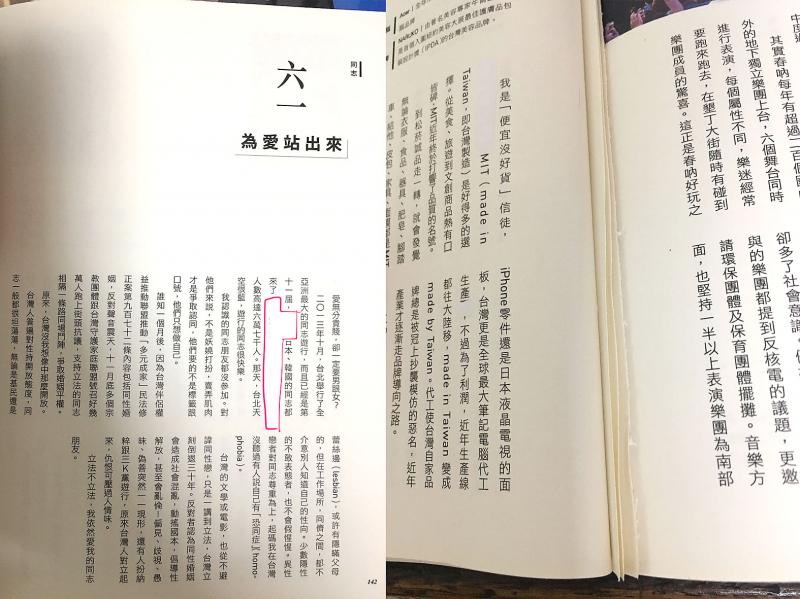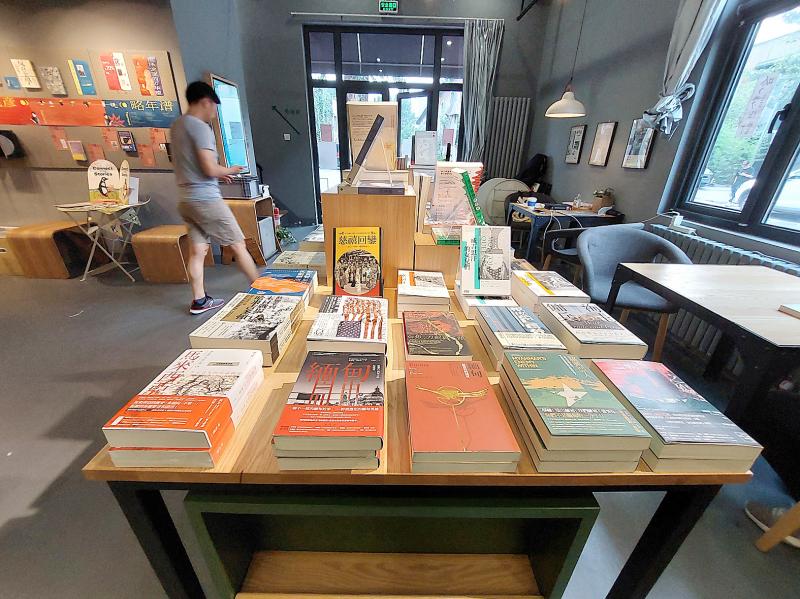Standards for Taiwanese book imports by Chinese resellers have become stricter, an independent bookstore owner in Beijing said yesterday.
In the past, with the exception of titles written by exiled Chinese writer Gao Xingjian (高行健), most books published in Taiwan could be imported to China, the owner said, speaking anonymously.
However, now certain publishers that print works touching upon subjects that are sensitive in China, such as democracy, protests and human rights, are now blacklisted entirely, the person said, citing the experiences of Gusa Publishing (八旗文化).

Photo: CNA
In other cases, books are allowed to be imported, but have entire sections torn out, or have words replaced or removed, they said.
For resellers in China to import Taiwanese books, they must first submit a list of titles they wish to purchase to a state-owned import company, and then there is a wait time of three months — up from six weeks previously — to receive the books, they said.
Regarding the increased time to import books, the owner said that while COVID-19 pandemic restrictions added to delays, a considerable factor was likely the stricter censorship process.

Photo: CNA
“In the past, I would give a list of 100 Taiwanese books to the importer, and about 50 would be approved. Now only around 20 to 30 are approved,” the owner said, adding that the criteria used to approve books is unclear.
Most books on politics and religion, even history books, cannot touch upon China or Taiwan to be imported to China, the person said.
Examples of banned books include the British Museum’s China: A History in Objects, and a selection from the Chinese University of Hong Kong, the shop owner said.
Works by Chinese-American writer Eileen Chang (張愛玲) describing life in China under the communists — such as The Rice Sprout Song and Naked Earth — have always been banned in China.
However, more recently, a book by Malaysian-Taiwanese writer Ng Kim Chew (黃錦樹) published last year that discusses the Chinese Civil War was banned, the person said.
“Some books we could import last year are banned this year. The standards often change, so all we can do is submit our lists and see what happens,” the owner said.
Importers sometimes tell bookstore owners to review and revise their lists before submitting them.
“However, I try to avoid self-censorship. I just submit my list without removing things, unless it is clearly obvious that the book is critical of the Chinese Communist Party,” the owner said.
Secondhand bookstores have also been affected by stricter censorship, the person said, citing Shanghai-based used-book and fashion accessory store Duo Zhua Yu (多抓魚).
The shop was once a popular place to buy books printed in traditional Chinese, but has recently had their inventory drastically reduced, the person said.
“Given the current state of cross-strait relations many bookstores won’t promote Taiwanese books at all, as they are afraid of causing a stir,” the shop owner said.

POSITIVE DEVELOPMENT: Japan and the US are expected to hold in-depth discussions on Taiwan-related issues during the meeting next month, Japanese sources said The holding of a Japan-US leaders’ meeting ahead of US President Donald Trump’s visit to China is positive news for Taiwan, former Japan-Taiwan Exchange Association representative Hiroyasu Izumi said yesterday. After the Liberal Democratic Party’s landslide victory in Japan’s House of Representatives election, Japanese Prime Minister Sanae Takaichi is scheduled to visit the US next month, where she is to meet with Trump ahead of the US president’s planned visit to China from March 31 to April 2 for a meeting with Chinese President Xi Jinping (習近平). Japan and the US are expected to hold in-depth discussions on Taiwan-related issues during the

‘LIKE-MINDED PARTNER’: Tako van Popta said it would be inappropriate to delay signing the deal with Taiwan because of China, adding he would promote the issue Canadian senators have stressed Taiwan’s importance for international trade and expressed enthusiasm for ensuring the Taiwan-Canada trade cooperation framework agreement is implemented this year. Representative to Canada Harry Tseng (曾厚仁) in an interview with the Central News Agency (CNA) said he was increasingly uneasy about Ottawa’s delays in signing the agreement, especially as Ottawa has warmed toward Beijing. There are “no negotiations left. Not only [is it] initialed, we have three versions of the text ready: English, French and Mandarin,” Tseng said. “That tells you how close we are to the final signature.” Tseng said that he hoped Canadian Prime Minister Mark Carney

President William Lai (賴清德) yesterday bestowed one of Taiwan’s highest honors on Saint Vincent and the Grenadines (SVG) Ambassador Andrea Clare Bowman in recognition of her contributions to bilateral ties. “By conferring the Order of Brilliant Star with Grand Cordon on Ambassador Bowman today, I want to sincerely thank her, on behalf of the Taiwanese people, for her outstanding contribution to deepening diplomatic ties between Taiwan and SVG,” Lai said at a ceremony held at the Presidential Office in Taipei. He noted that Bowman became SVG’s first ambassador to Taiwan in 2019 and

A man walks past elementary school artworks at the Taipei Lantern Festival in Ximen District yesterday, the first day of the event. The festival is to run from 5pm to 10pm through March 15.